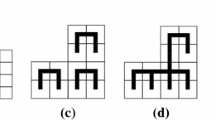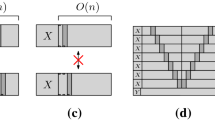Abstract
This paper concerns the self-assembly of scaled-up versions of arbitrary finite shapes. We work in the multiple temperature model that was introduced by Aggarwal, Cheng, Goldwasser, Kao, and Schweller (Complexities for Generalized Models of Self-Assembly, SIAM J. Comput. 2005). The multiple temperature model is a natural generalization of Winfree’s abstract tile assembly model, where the temperature of a tile system is allowed to be shifted up and down as self-assembly proceeds. We first exhibit two constant-size tile sets in which scaled-up versions of arbitrary shapes self-assemble. Our first tile set has the property that each scaled shape self-assembles via an asymptotically “Kolmogorov-optimum” temperature sequence but the scaling factor grows with the size of the shape being assembled. In contrast, our second tile set assembles each scaled shape via a temperature sequence whose length is proportional to the number of points in the shape but the scaling factor is a constant independent of the shape being assembled. We then show that there is no constant-size tile set that can uniquely assemble an arbitrary (non-scaled, connected) shape in the multiple temperature model, i.e., the scaling is necessary for self-assembly. This answers an open question of Kao and Schweller (Proceedings of the 17th Annual ACM-SIAM Symposium on Discrete Algorithms (SODA 2006), pp. 571–580, 2006), who asked whether such a tile set exists.
Similar content being viewed by others
References
Adleman, L., Cheng, Q., Goel, A., Huang, M.-D.: Running time and program size for self-assembled squares. In: Proceedings of the Thirty-third Annual ACM Symposium on Theory of Computing (STOC 2001), New York, NY, USA, pp. 740–748. ACM, New York (2001)
Barish, R.D., Schulman, R., Rothemund, P.W., Winfree, E.: An information-bearing seed for nucleating algorithmic self-assembly. Proc. Natl. Acad. Sci. USA 106(15), 6054–6059 (2009)
Becker, F., Rapaport, I., Rémila, E.: Self-assembling classes of shapes with a minimum number of tiles, and in optimal time. In: Foundations of Software Technology and Theoretical Computer Science (FSTTCS), pp. 45–56 (2006)
Chen, H.-L., Goel, A.: Error free self-assembly with error prone tiles. In: Proceedings of the 10th International Meeting on DNA Based Computers (2004)
Cheng, Q., Aggarwal, G., Goldwasser, M.H., Kao, M.-Y., Schweller, R.T., de Espanés, P.M.: Complexities for generalized models of self-assembly. SIAM J. Comput. 34, 1493–1515 (2005)
Demaine, E.D., Demaine, M.L., Fekete, S.P., Ishaque, M., Rafalin, E., Schweller, R.T., Souvaine, D.L.: Staged self-assembly: nanomanufacture of arbitrary shapes with O(1) glues. Nat. Comput. 7(3), 347–370 (2008)
Doty, D.: Randomized self-assembly for exact shapes. SIAM J. Comput. 39(8), 3521–3552 (2010)
Doty, D., Lutz, J.H., Patitz, M.J., Summers, S.M., Woods, D.: Intrinsic universality in self-assembly. In: Marion, J.-Y., Schwentick, T. (eds.) Proceedings of the 27th International Symposium on Theoretical Aspects of Computer Science (STACS 2010), Dagstuhl, Germany. Leibniz International Proceedings in Informatics (LIPIcs), vol. 5, pp. 275–286. Schloss Dagstuhl–Leibniz-Zentrum fuer Informatik, Wadern (2010)
Kao, M.-Y., Schweller, R.T.: Reducing tile complexity for self-assembly through temperature programming. In: Proceedings of the 17th Annual ACM-SIAM Symposium on Discrete Algorithms (SODA 2006), Miami, Florida, Jan. 2006, pp. 571–580 (2007)
Kao, M.-Y., Schweller, R.T.: Randomized self-assembly for approximate shapes. In: International Colloqium on Automata, Languages, and Programming (ICALP). Lecture Notes in Computer Science, vol. 5125, pp. 370–384. Springer, Berlin (2008)
Lathrop, J.I., Lutz, J.H., Summers, S.M.: Strict self-assembly of discrete Sierpinski triangles. Theor. Comput. Sci. 410, 384–405 (2009)
Reif, J.H.: Local parallel biomolecular computing. In: DNA Based Computers III. DIMACS, vol. 48, pp. 217–254. Am. Math. Soc., Providence (1999)
Rothemund, P.W.K.: Theory and experiments in algorithmic self-assembly. Ph.D. thesis, University of Southern California, December 2001
Rothemund, P.W.K.: Folding DNA to create nanoscale shapes and patterns. Nature 440(7082), 297–302 (2006)
Rothemund, P.W.K., Winfree, E.: The program-size complexity of self-assembled squares (extended abstract). In: Proceedings of the Thirty-second Annual ACM Symposium on Theory of Computing (STOC 2000), New York, NY, USA, pp. 459–468. ACM, New York (2000)
Rothemund, P.W.K., Papadakis, N., Winfree, E.: Algorithmic self-assembly of DNA Sierpinski triangles. PLoS Biol. 2(12), 2041–2053 (2004)
Seeman, N.C.: Nucleic-acid junctions and lattices. J. Theor. Biol. 99, 237–247 (1982)
Soloveichik, D., Winfree, E.: Complexity of self-assembled shapes. SIAM J. Comput. 36(6), 1544–1569 (2007)
Vitányi, P., Li, M.: An Introduction to Kolmogorov Complexity and Its Applications. Springer, Berlin (1997)
Wang, H.: Proving theorems by pattern recognition—II. Bell Syst. Tech. J. XL(1), 1–41 (1961)
Wang, H.: Dominoes and the AEA case of the decision problem. In: Proceedings of the Symposium on Mathematical Theory of Automata, New York, 1962, pp. 23–55. Polytechnic Press of Polytechnic Inst. of Brooklyn, Brooklyn (1963)
Winfree, E.: Algorithmic self-assembly of DNA. Ph.D. thesis, California Institute of Technology, June 1998
Winfree, E., Bekbolatov, R.: Proofreading tile sets: Error correction for algorithmic self-assembly. In: Chen, J., Reif, J.H. (eds.) DNA. Lecture Notes in Computer Science, vol. 2943, pp. 126–144. Springer, Berlin (2003)
Author information
Authors and Affiliations
Corresponding author
Rights and permissions
About this article
Cite this article
Summers, S.M. Reducing Tile Complexity for the Self-assembly of Scaled Shapes Through Temperature Programming. Algorithmica 63, 117–136 (2012). https://doi.org/10.1007/s00453-011-9522-5
Received:
Accepted:
Published:
Issue Date:
DOI: https://doi.org/10.1007/s00453-011-9522-5




